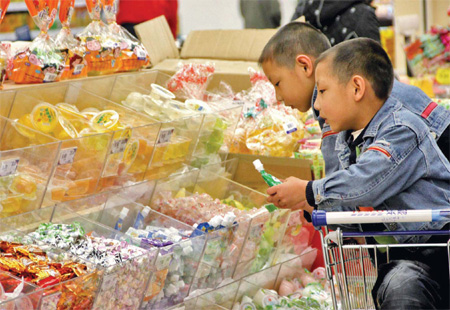Sweet Business
Updated: 2011-07-22 14:08
By Lin Jing (China Daily European Weekly)
|
|
Multinational companies are trying to take bite out of confectionery industry in china
Foreign confectionery companies are stepping up their operations in China to cash in on a fast-growing market. Nestle, the Swiss confectionery giant and world's biggest food and drink company, recently announced its intentions to acquire a 60 percent stake of Hsu Fu Chi International Ltd (HFCI). If approved by regulators, the 1.19 billion-euro acquisition of the Chinese candy maker will become one of the biggest foreign takeovers of a Chinese company.
Chen Chen, an analyst with CIConsulting, says that the deal would help boost Nestle's confectionery business, which makes up about 12 percent of its total sales. And, HFCI's mature distribution channels provide a fast track for Nestle's penetration into second- and third-tier markets.
"For a multinational giant like Nestle, China, as an emerging market, provides a huge potential for future growth."
According to data from CIConsulting, between January and November in 2010, the total sales in the confectionery market was 12.9 billion euros, making up 11.7 percent of the food industry. It is an increase of 36.6 percent when compared to the same period in 2009.
"The average annual sales in the confectionery industry recorded a 10 percent growth in the past few years, and there are remarkable improvements in product types and quality," says Zhou Siran, a food industry consultant with CIConsulting.
"Despite the fast increase in sales, the confectionery consumption per person per year in China is far from that in the US and Europe," Zhou says.
In 2009, the yearly consumption per person was 36.4 kilograms in the UK, 25.4 kilograms in the US, and only 4.1 kilograms in China, according to Euromonitor, an international market research firm.
Zhou says that as Chinese people have a rising disposable income and their standards of living improve, confectioneries have a huge potential for growth.
Among the fierce competitors of many multinational confectioners, HFCI has steadily grown during the past few years.
The Guangdong-based company, founded in 1992 by the Hsu brothers from Taiwan, has 45 large-scale production plants and can make over 700 different types of confectionery products, including cakes, candies and sachima, a Chinese pastry.
In the fiscal year that ended June 30, HFCI reported its profit rose 31 percent to 65.4 million euros as sales increased 14 percent to 468.1 million euros, according to Bloomberg. Euromonitor's data show HFCI has retained its No 1 position in the domestic candy segment since 1998.
"Nestle is eyeing at the over 30 percent of gross margin of sugar confectionery," says Shu Guohua, a visiting professor at Peking University.
But Nestle isn't the only multinational company with a sweet tooth for growth.
In January 2010, Kraft Foods, the biggest confectioner in North America, bought the well-known British brand Cadbury for 13.4 billion euros.
Lorna Davis, president and chairwoman of Kraft's China operations, says that in the coming two years, the company is planning to distribute Cadbury products to 40 more cities in China.
"If I had unlimited resources and unlimited people, I would bring in everything Kraft has, but right now the focus is really on integrating Cadbury and growing our line of biscuits," said Davis in an interview last year with Reuters. Kraft also sells items such as Oreo cookies, Maxwell coffee, Ritz crackers, Kraft macaroni and cheese and many other popular products.
She says that besides chocolate, Kraft is also trying to promote cakes and pop tarts in China's breakfast market in an effort to replace the usual fare of noodles and porridge.
E-paper

Pearl paradise
Dreams of a 'crazy' man turned out to be a real pearler for city
Literary beacon
Venice of china
Up to the mark
Specials

Power of profit
Western companies can learn from management practices of firms in emerging economies

Foreign-friendly skies
About a year ago, 48-year-old Roy Weinberg gave up his job with US Airways, moved to Shanghai and became a captain for China's Spring Airlines.

Plows, tough guys and real men
在这个时代,怎样才"够男人"? On the character "Man"

